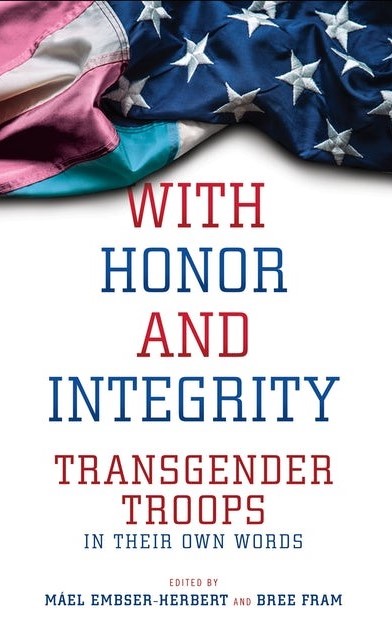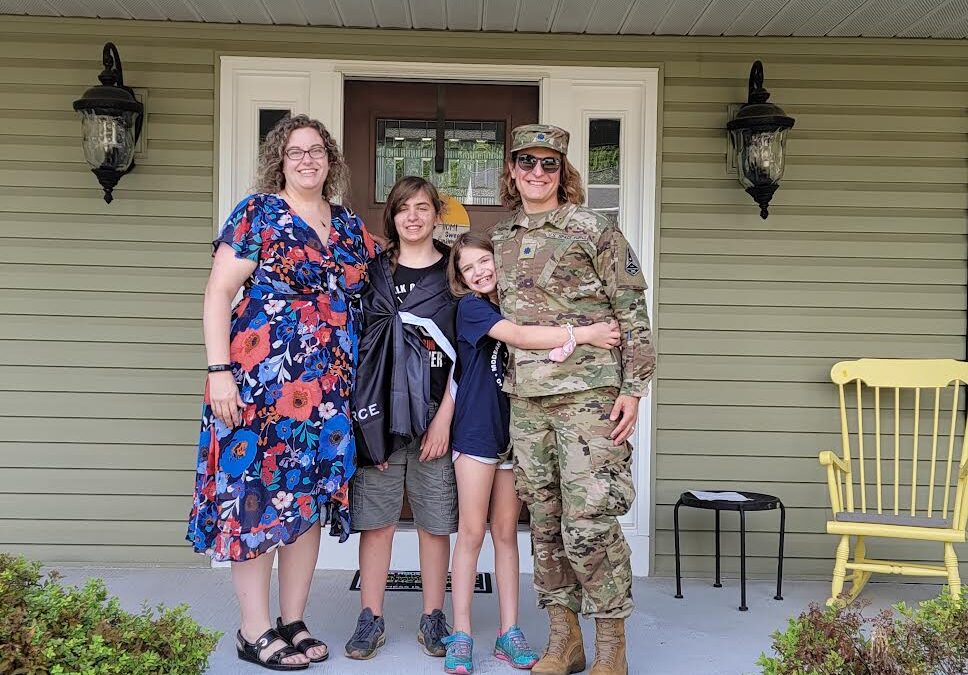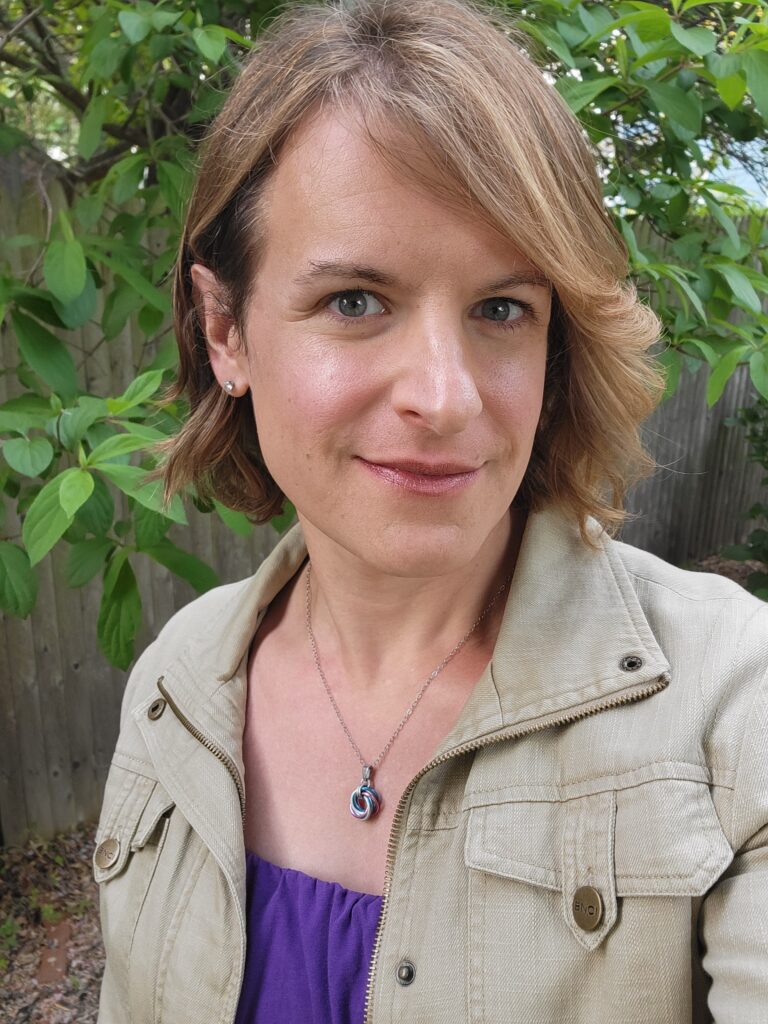
On this week’s 51%, we focus on women in service. WAMC’s Ashley Hupfl takes us to a ceremony for living veterans in Albany, New York. Karen Dewitt reports on a program for veterans with PTSD that’s seeking full funding in the New York state budget. And we speak with Lt. Col. Bree Fram and Army veteran Mael Embser-Herbert about their new book, With Honor and Integrity: Transgender Troops in Their Own Words.
Guests: Bree Fram, lieutenant colonel with the U.S. Space Force; Mael Embser-Herbert, U.S. Army veteran and professor at Hamline University
51% is a national production of WAMC Northeast Public Radio. Our producer is Jesse King, our executive producer is Dr. Alan Chartock, and our theme is “Lolita” by the Albany-based artist Girl Blue.
Follow Along
You’re listening to 51%, a WAMC production dedicated to women’s issues and experiences. Thanks for joining us, I’m Jesse King. November 11 is Veterans Day, and thanks to the COVID-19 vaccine, many communities were able to resume their ceremonies and festivities for the first time since the start of the pandemic. Here in Albany, the Veterans Day parade was back in full force as it made it way down Central Avenue. So today we’ve got a trio of stories and interviews centered around women in the military, and the range of issues veterans of all genders face.
In New York, Governor Kathy Hochul recently signed a package of bills meant to support veterans and their families — but a bipartisan group of lawmakers are still hoping the governor will commit to full funding for a program that helps veterans coping with PTSD. Capitol Correspondent Karen Dewitt reports.
You can find Karen Dewitt’s story here.

Our next guests are the editors of a new book with New York University Press, titled With Honor and Integrity: Transgender Troops in Their Own Words. When the U.S. repealed its “Don’t Ask, Don’t Tell” policy on gay members of the military in 2011, it notably left out members of the transgender community. Now, there are varying numbers on just how many transgender service members there are in the U.S. — a 2014 study by the Williams Institute at UCLA put the number over 15,000, a 2016 workplace survey cited by the Department of Defense reported 9,000, and a 2018 analysis by the Palm Center once again raised it to about 14,700. But that’s at least partially because the military’s stance on transgender service members has been in flux over the past several years.
In 2016, then-President Barack Obama’s Secretary of Defense, Ashton Carter, announced a new policy allowing transgender people to serve openly and obtain access to gender-affirming medical and psychological care — but just over a year later, then-President Donald Trump moved to reverse that in a series of tweets, stating: “The United States government will not accept or allow transgender individuals to serve in any capacity in the U.S. Military.” This was reversed again by President Joe Biden earlier this year — so for now, transgender people can enlist, serve openly, and get the care that they need. But like everything, their status has been caught in politics.
Bree Fram is a lieutenant colonel openly serving as a transgender woman in the Space Force, making her the highest-ranking transgender officer in the U.S. military. She’s also the president of SPARTA, an advocacy group dedicated to transgender service members, and before her role at the Space Force she served with the Air Force in Iraq. Embser-Herbert is a veteran of the Army and a sociology professor at Hamline University in St. Paul, Minnesota. They’re the author of books like The U.S. Military’s “Don’t Ask, Don’t Tell” Policy: A Reference Handbook, and have long focused on issues involving gender and sexuality in the military.
What made you want to make this book?
Embser-Herbert: In October 2017, I had the opportunity to go to a little film festival here in the Twin Cities. And one of the films that was shown was about trans military service. And I was watching it, and in that time, we’d had the 2016 announcement of inclusive service, and then the 2017 tweets saying, “No, go away,” and I sat there thinking, “What have people done here? We’ve had 13 months where people made decisions and changed lives. And now we’re like, ‘No, no, no, you can’t do that.'” And there was an openly trans captain in the Minnesota National Guard who made a few comments after the film, and I just thought, “I want to find out how people are dealing with this shifting terrain.” So I decided that I would see if I could even conduct a few interviews and sort of cast the net out there. And Bree was one of the folks that responded, so I did some interviews and published that as a journal article. But I wanted to do something else. And I knew that I didn’t want to do traditional sociological research that made the trans servicemembers kind of the object of my gaze or my inquiry. And longer story short, [I] decided that this was the project that I wanted to pursue, where I could perhaps be the mechanism by which trans military personnel could tell their own stories.
Fram: So we have 26 contributors in the book. Stories ranging from veterans who served in the Vietnam era, to many of our service members who are still serving today. So there’s a wide range of stories that we’ve captured in this book.
When you were putting together this book, what were you hearing from service members?
Fram: One of the biggest things you can take away from these stories is how there is no one way to be trans. There is no one way to be trans in the military. It is the uniqueness of the individuals and the uniqueness of their stories that really stand out. Some are funny, some are poignant, some are sad, and [its] even heartbreaking to a point, what some of these folks have been through. But all of them, to me are inspiring: these folks served despite the barriers that were in place, and they just wanted to be a part of the military, to serve their country, and really to leave the world a better place.
The book’s title draws from the military’s values of honor and integrity, but for trans members, they’ve had to conceal their identity for some or all of their service. For you Bree, how were you able to balance your service with your need to be who you are?
Fram: So my experience as a transgender service member is just one of many. But overall, we can say that the general reaction to people coming out is a positive one. While the argument out there is that trans people coming out and being part of the service will degrade unit cohesion, that’s proven wrong over and over again by the reception that people get. When I came out, it was when the Secretary of Defense finished speaking, to announce an open service policy in 2016. And I had an email ready to go to my colleagues, and a Facebook post to the world. And though I was nervous — I hesitated — I hit send, I hit post, and wondering what the reaction was going to be, I fled. I went to the gym in the basement of the Pentagon, burned out the motor on an elliptical machine going incredibly fast and nowhere. But when I got back to my desk, one by one, my colleagues walked over to me, shook my hand, and said, “It’s an honor to serve with you.” So that’s just one of the incredible reactions that some of us have received, you know, for being open, for being authentic. That really adds something to the team. It doesn’t take away from it.
What was it that made you want to join the military?
Fram: It was 9/11 that changed my life, and change the trajectory of where I was headed. I had just graduated college in 2001, and I was looking for jobs when we were attacked. And that absolutely changed my worldview to something where I wanted to give back. I wanted to be a part of something greater than myself, to defend all the amazing things that I’ve been given. So a few days after the September 11 attacks, I was driving from my home at the time in the Minneapolis / St. Paul area, to my then-girlfriend, now wife’s place in Duluth, Minnesota — and I saw an American flag hanging from an overpass about halfway on that drive. And I broke down. I was just crying through the remaining hour of that drive. But when I got to her place, I walked in and said, “I’m going to join the Air Force.” And it’s a great decision. I’ve been able to do some incredible things, and I’m so honored for what I’ve been able to do on behalf of this country. It’s been an amazing experience.
Embser-Herbert: Well, I joined in an entirely different era. We were still in the Cold War, way, way back. And honestly, I was in college at a time when, unlike today, universities didn’t spend any time talking with you about what you might do with your degree, that kind of thing. And growing up, I had always wanted to do something tied to law enforcement. And I realized that I could be in the Military Police Corps. And so that was an avenue to do something in law enforcement at a time when there weren’t a lot of opportunities in the civilian sector. So I graduated and signed up.
What are some of the things that you remember most, or take away from your service?
Fram: So maybe my my craziest memory was back in 2004, when I deployed as part of Operation Iraqi Freedom. And I got to the base where we were at in Iraq, and it was my first night there, and I go into the tent to try and get some sleep — and in the middle of the night, the air raid sirens start going off, because the base is under attack from from mortars. And I look around, and no one is doing anything. And I’m like, “Oh, my God, should I roll out of bed? Should I get under? Should I put my body armor on? What should I do?” No one is doing anything, so I just go back to sleep. And I asked the question of my teammates in the morning, like, “Why is that?” and they’re like, “Well, these attacks are so quick, they’re so fast, that by the time the air raid siren goes off, the attack is over. So if you’re not dead or screaming, just go back to sleep. Do what you need to do to get ready for the next day in the mission that we have.” So a crazy experience that will always stick with me.
Embser-Herbert: Wow. I’ve not heard that story before. Well, having served in peacetime, I, of course, don’t have those experiences. And to be honest, I typically say that, as someone who was serving as a female person a long time ago, I have a love-hate relationship with a lot of what I experienced, because things were pretty darn bad for women in the late ’70s, early ’80s in the military. That said, after I got off active duty and was in the Reserves, I attended Officer Candidate School at Fort Benning, which is sometimes known as Benning School for Boys because of its history. And to go through that program and receive my commission — not through some of the alternative paths that are out there, but through OCS, on active duty — is still a pretty big thing for me to realize that I did, especially when you consider that I did that in the mid ’80s, when it was a very different climate from today.
Bree, you mentioned that when you came out to the people you worked with, they were very supportive. As you spoke with other individuals for this book, is that generally what you were hearing? Was there more acceptance among rank-and-file members compared to the administration?
Fram: So I will say that my experience is certainly filtered through my privilege, as someone who’s white, someone who’s a senior officer, working in a nerdy career field (then in the Air Force now in the Space Force) — but even those younger troops who may be an African American or Latino infantryman in the army, or the Marines, as a general rule, [I’ve heard] positive coming out experiences, because what we’re valued for is what we contribute to the mission. And if you’re doing that, you’re a valued member of the team. And that’s not to say, though, that there are some people that have had negative experiences. They happen, they continue to happen. And it’s incumbent on us through sharing stories like ours in this book to change that culture, to make for a better culture of diversity, inclusion, and importantly, you know, tapping into everyone’s potential within the military, so we can all be better.
What was it like when then-President Trump launched those tweets in 2017? What effect did that have within the transgender community?
Fram: Well, that’s a big question, because that was a crazy, crazy day. And honestly, the first thought that went through my head when my phone started blowing up that morning with texts and tweets is, “Are we at war?” Because I was trying to figure out what was going on. But when you find out, “Oh, the president’s just trying to ban trans people from serving,” then your mind immediately goes to “Why? What what prompted this? What now? Do I have a job tomorrow?” And the best thing that any of us could do the next day, was to lace up our boots and get the job done, and do so over and over again, until we were dragged kicking and screaming from the service that we love so much, and that we dedicated our lives to.
But in a weird way, I look back and I say thank you to President Trump, because he shone a spotlight on our service that had never been there before. When he tweeted about, 50 percent of the American public and 50 percent of the military was in favor of transgender people serving. Less than two months later, because of that media spotlight — because of the drill sergeant who happened to be transgender in People Magazine, and a transgender military couple on the Ellen Show, and so many other people getting their stories out there — opinion changed dramatically, going up to 70 percent of both the American public and the military in just two months. Within two years, it was in the high 80 percent. So it’s crazy to think that that swung so fast, so dramatically, all thanks to the president claiming we were a burden on the service, and us getting the opportunity to show just how wrong he was.
Do things feel better now?
Fram: So there certainly is that fear some people have, that we can go from administration to administration and flip the switch, because all that it takes is an executive order. Which is why to me it’s so important that there be a law that gives the opportunity to serve to all people, regardless of gender identity or other characteristics. Where as long as they can meet the criteria that the military needs for you to serve, the opportunity should be there to do so. So that’s really important as we go forward, to add a little stability into our service members’ lives.
Embser-Herbert: And I would just echo that, because last week when we had the elections, and a lot of the media coverage was, you know, all focused on the Democrats and the failures and so forth. And we start hearing about, well, the midterms are coming…If you start looking at a lot of the coverage of elections, even local elections, and you start thinking forward, I was actually replaying Bree in my head, saying exactly this: that as long as this is not codified in law, people will remain vulnerable with a switch of leadership.
How is the path toward acceptance for trans service members similar or different from that of women, African Americans and LGB members? And is there anything else that can be done to support trans service members right now?
Embser-Herbert: Well, one of the things that I have said for years, and it is sometimes a contentious point, is that while those groups are not the same, the arguments that have been deployed to attempt to keep people out, or to successfully keep them out, have been very, very similar. And we saw them change with African Americans and change with women and change with LGB people — and each time along the way, the things that were predicted as, “Oh, my gosh, the sky is falling,” simply did not materialize. I joke with my students, and no one’s ever accused me of saying the glass was half full. But I look at what’s happened in the past and find myself saying, “We have to have learned something.” And in fact, specific arguments like unit cohesion, which we’ve seen debunked time and time again, are much harder for people to make. And honestly, I think we’ve seen less of an effort by what I’ll loosely call the opposition to latch on to those arguments, because they simply know they don’t hold up.
Fram: Now, the one that often is brought up is the medical and the cost issue. But for transgender servicemembers, it’s the same as it is for every other service member, where there is a compact between the Department of Defense and its service members, that all medically necessary care will be provided to ensure you are your most capable and you’re most ready for your wartime mission. And that’s exactly what we are providing to transgender service members: where something has been determined to be medically necessary by a doctor, that care is provided. And that service member is then both a better individual and a better contributor to their team. And if you look at the flipside, if we were to deny care, then you’re inviting a whole host of other problems that, in the long run, may end up costing the department and the country more.
Time is one of the biggest things that we have on our side. Whereas today, we would look back and think of a military without African Americans, women, lesbians, gays, bisexuals — you know, that would be unconscionable. How could we possibly have a military without any of those groups? And I would hope that it’ll be the same with transgender people. That after a little bit of time, it’ll be just as unconscionable to imagine a military without us, because we’ve had years to prove ourselves over and over again, simply by showing up and getting the job done every day, here at home and around the world.
Just in general, what else can we do to support our veterans?
Embser-Herbert: I don’t say this in a self-serving way, but I read the stories, read the book. You know, see what it is that people are contributing, so it’s not just about a snapshot of, “Oh, this happened to me” or what have you. But really look and see people’s commitment. I’m in academia, so not to throw stereotypes around, but you can imagine that I talked to more than a few people who are like, “Military, really?” And, you know, the thing is when they just scratched the surface, they’re so moved by what it is that people have chosen to do, and the commitment they’ve made to their service. So I just think that, whether it’s through the book or some other mechanism, really familiarizing oneself with people as individuals who have real lives, and not just attending to sound bites and snippets and such [is important].
Fram: One of the big things that is going on to support veterans right now is the VA is reviewing its policies for how to provide transgender care, particularly surgical care. That’s a huge deal to our transgender veterans. And if you look, historically, trans people have served at twice the rate of their cisgender counterparts. So there are a lot of transgender veterans out there, and being able to access that medically necessary care, that’s going to be a huge boon to them. But again, respect them for their stories and all that they’ve done for all of us.
Lastly, Bree, I’d just like to ask you a little bit about the Space Force, because it sounds pretty cool to me. What kind of work are you doing there, and what made you want to join it?
Fram: So I am an Acquisition Officer working at the Pentagon. The Space Force as a whole has to continue on the proud legacy of all the space missions that have come out of the Department of Defense up till now — you know, maintaining the capability that we have to provide GPS service, which underpins every car trip we take. And it’s not just that, but the Space Force has to prepare for when conflict inevitably moves into space. How do we prepare ourselves to defend those capabilities, to provide the support that the rest of our armed services need if they get into conflict somewhere? And then how do we fight in space? When someone goes to mine an asteroid, how do we protect and defend them? So there’s a lot of really cool concepts that we have to start thinking about. But more exciting is just being part of a new service. Getting that opportunity to help set the culture for a true 21st Century military, one that does value every individual for what they can contribute, and enables them to reach their full potential. The opportunity to be part of a new service doesn’t come around more than every several generations. That’s awfully exciting to me.
Lt. Col. Bree Fram and Mael Embser-Herbert are the editors behind With Honor and Integrity: Transgender Troops in Their Own Words, out now on New York University Press. You can learn more about the book at nyupress.org, and more about SPARTA at spartapride.org. Bree Fram and Mael Embser-Herbert — thank you both so much for taking the time.
We’re gonna close out today’s episode by recognizing some veterans in Albany, New York. Leading up to Veterans Day, two veterans were honored at the city’s biannual Honor a Living Veteran ceremony. WAMC’s Ashley Hupfl was there.
You can read Ashley Hupfl’s story here.
Thanks for listening to this week’s 51%. 51% is a national production of WAMC Northeast Public Radio. It’s produced by me, Jesse King. Our executive producer is Dr. Alan Chartock, and our theme is “Lolita” by the Albany-based artist Girl Blue. A big thanks to Lt. Col. Bree Fram, Mael Embser-Herbert, Karen Dewitt and WAMC’s Ashley Hupfl for contributing to this week’s episode. To learn more about our guests and the show in general, check us out at wamcpodcasts.org. Next week, we meet some of the journalists, writers, and filmmakers selected for this fall’s Logan Nonfiction Program. But until then, I’m Jesse King for 51%.


